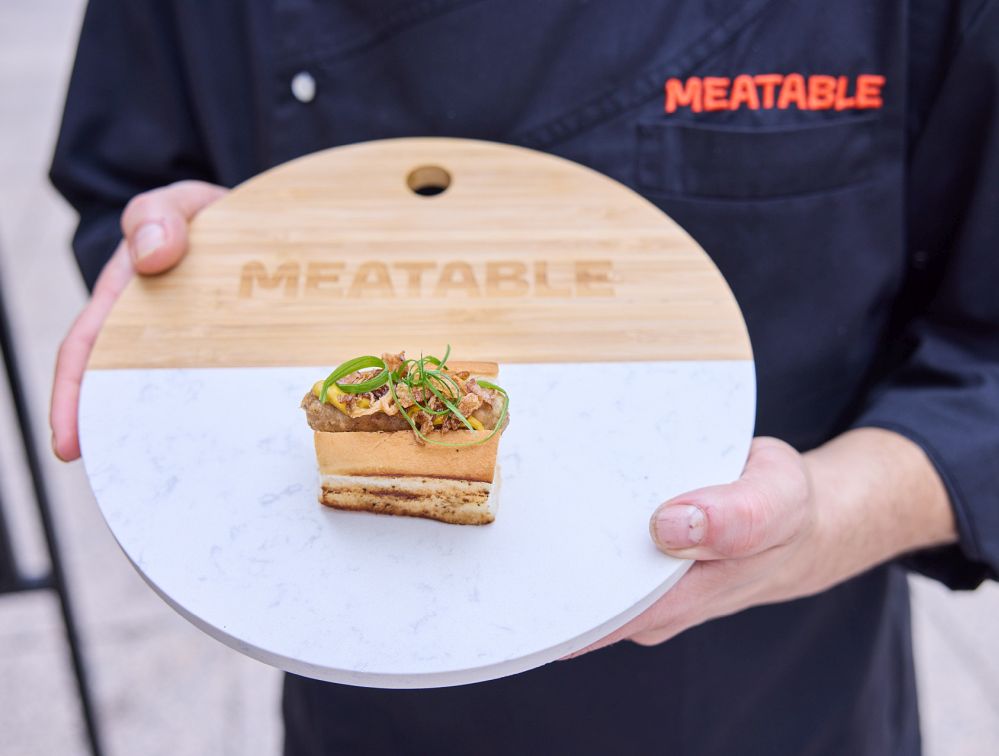Dutch startup Meatable has slashed production times for cultivated pork in recent months by dramatically speeding up the process by which its stem cells differentiate into fat and muscle, further improving its unit economics at a time when the industry is facing intense scrutiny.
Speaking to AgFunderNews at the Future Food-Tech conference in San Francisco last week, cofounder and CTO Daan Luining acknowledged it was a challenging time for the cultivated meat industry with investment plunging last year, but noted that Meatable had secured the largest round ($35m series B) in the sector in 2023, taking its total funding to just under $100 million.
“I think what we’re seeing is a natural cycle for all innovation, where you see hype, then stagnation, then consolidation, and then redirection,” said Luining, a biologist who cofounded Meatable in 2018 with stem cell biologist Dr. Mark Kotter and McKinsey exec Krijn de Nood. “But the companies with something unique and of value will stay because they have something worth investing in.
“I’ve been in this space for almost a decade now and I do think that a lot of companies just got in with the idea that they could take off-the-shelf stuff without true innovation and then build the train tracks while the train was running. Maybe you can make it work if you find something of value during the ride, but we started with a unique technology and that has allowed us to make progress without succumbing to hype and trying not to oversell anything.
“Unfortunately the industry has not taken that route so now we have to readjust a little bit. But I do think that it’s natural we’ll see a shakeout of companies that didn’t hold true to their promises and didn’t have something unique to defend.”
Economics that add up at 10,000-liter scale
Meatable, which recently opened a new pilot facility in Leiden enabling it to increase its bioreactor capacity from 50-L to 200-L and later to 500-L, aims to launch at a small scale in Singapore with co-manufacturer Esco Aster later this year pending regulatory approval with hybrid products containing cultivated- and plant-based meat, said Luining.
“In Singapore we’re currently successfully working with 500-L bioreactors. We filed a regulatory dossier there last year, and we’re expecting news any day now [to get the go-ahead] for a small restaurant launch. We’re also eyeing the US market.
“We’ve had conversations with the FDA and we’ve been back and forth saying ‘Hey, this is what the Singaporean government asked us to file, what do you think about this?’ This kind of active conversation is to be applauded, because in Europe it has been hard to have those types of conversations.”
To achieve profitable unit economics, which Luining reckons is feasible at a commercial-scale plant with 10,000-liter bioreactors given the speed and efficiency of its process, Meatable is seeking partnerships, although it has nothing to announce at this stage, he said. “Building large-scale factories [in-house] is very capital intensive and right now the VC market won’t support that.”
“We are very clear about wanting to be a credible, trust-worthy company and are taking the process towards commercialization with a methodical, step by step approach.” Daan Luining, cofounder and CTO, Meatable

Opti-Ox technology: ‘This is really a breakthrough in stem cell biology’
Rather than ‘re-programming’ or inducing adult cells to get them to behave like embryonic stem cells (which can differentiate into any cell type), Meatable is extracting pluripotent stem cells from animals’ umbilical cords. These cells have certain advantages including rapid division and versatility (they can differentiate or transform into multiple different cell types such as fat or muscle), said Luining.
“You don’t need fetal bovine serum since their innate program for growth is already on. They grow suspension without microcarriers, and they are very sturdy when it comes to large scale expansion.”
However, Meatable’s secret sauce is its ability to understand the internal machinery within the cells that triggers them to develop into different cell types by deploying patented ‘Opti-Ox’ technology developed by cofounder Dr. Mark Kotter.
This activates transcription factors (combinations of which encode the identity of cells) with a precision “rarely seen in biology,” enabling Meatable to both precisely control and dramatically speed up the differentiation process, said Luining.
“We’re using cells’ natural ability to turn into muscle or fat by pressing the buttons that turn them into muscle or fat. This is really a breakthrough in stem cell biology. We went from 45 days to 21, then eight, and now four days [to differentiate pluripotent stem cells into muscle and fat cells]. Doing it this fast is ultimately what makes our cultivated meat production process economically viable.”
Continuous perfusion process
Meatable operates a continuous perfusion process, he explained: “So we have one bioreactor for cell production and then we siphon off cells every day because they double every 16 to 24 hours. So if you have a 100% full bioreactor, the next 24 hours you’ll have another 100% full bioreactor, so you siphon off 100% of the volume of cells into a second phase [bioreactor] where you start the differentiation process [which requires different media].
“The faster you can do that, the fewer second-stage bioreactors you need, and the less time the cells spend in that bioreactor where you have to feed them nutrients and growth factors and heat. So there’s less CapEx on bioreactors and less OpEx [labor, energy, water etc] on the maintenance of the cells in the bioreactor.”
While there are pros and cons to each approach (batch, fed batch etc) to growing cultivated meat, “perfusion is definitely for us the way to go because we get very high cell densities and we’re actually able to use less media to produce a kilogram [of meat] using a perfusion set up because we’re very precisely feeding cells over time,” said Luining. “Perfusion creates extra complexity but it’s worth it.
“Right now we’re looking at stir tanks [where the contents of the bioreactor are agitated by propellers to ensure even distribution of oxygen and nutrients throughout] up until a certain size of roughly around 10,000-liters and then we’re trying to determine do larger stir tank reactors still support cell growth for the future?”
He added: “The other thing to consider is how many cells per milliliter your bioreactor supports because if you have a 10,000-liter reactor with only three cells grow in it, it’s useless. But if you have a 5,000-liter reactor and a gazillion cells, that’s another matter. We’ve done extensive lifecycle analyses, and with the densities that we’re reaching now, when we translate that to 10,000 liters, there’s where we start to become economically profitable.”
‘Differentiation is going to be critically important’
While Meatable is not making structured products such as beef steak or pork chops or deploying a tissue engineering approach for its first products, the cells it harvests are fully differentiated, which is important from a nutritional perspective, said Luining.
“Some players use undifferentiated cells, but if you don’t differentiate you can’t really recreate the experience of meat, so I think differentiation is going to be critically important. Don’t get me wrong; we’re not making a steak [with fully-fledged muscle tissue] but we are making high quality fat and muscle. There are unique characteristics of the compounds that [fully differentiated] cells make that are delicious and nutritious. But you have to be able to do it with the efficiency and speed that makes it cost-effective.”
Media costs: The chicken and egg conundrum
Asked about bringing down the cost of cell culture media, which is largely a function of scale, he acknowledged that the industry is in something of a chicken and an egg situation in that suppliers of the pricier components lack the incentive to scale up without assurances that there will be multiple large-scale cultivated meat plants to supply in the near future, which is by no means guaranteed in the current funding environment.
“There’s a natural tension between what we think we will need in the future and what the demands are right now,” said Luining. “But there are also a lot of people in this industry that are actively innovating and helping the industry to address these challenges so we’re having a lot of conversations with different players about how to reduce costs and prepare the supply chain for larger volumes.”
He added: “The reduction of media costs is one of our main goals for the coming year, and we have a team in the Netherlands dedicated to just that. In the last year, we have been able to reduce our media costs for some of these nutrients by 100x, in part thanks to a joint research project with Royal DSM. This is also why the speed element of our process is so important; it drives down the number of reactors required, the amount of media we need, as well as labor and energy, which all makes it more affordable, easier to scale and reduces the impact of meat on the environment.”
Further reading:
Eat Just CEO: Large-scale cultivated meat production requires a new operating model
Cultivated meat consolidation begins as UMAMI Bioworks to merge with Shiok Meats
GFI highlights chicken-and-egg conundrum facing cultivated meat industry
Crunch time for cultivated meat: ‘Probably 70-90% of players will fail in the next year’





